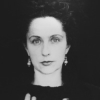Kiki Smith

Kiki Smith
Kiki Smithis a West German-born American artist whose work has addressed the themes of sex, birth and regeneration. Her figurative work of the late 1980s and early 1990s confronted subjects such as AIDS, gender and race, while recent works have depicted the human condition in relationship to nature. Smith lives and works in the Lower East Side neighborhood of New York City...
NationalityAmerican
ProfessionSculptor
Date of Birth18 January 1954
CityNuremberg, Germany
CountryUnited States of America
I like Betsy Ross as a model, too, the quilting bee, sitting around with your friends making art, asking what they think, so that you get the benefit of everyone's opinions and so it's not just about you in your you-dom.
I think a lot of making art is listening to yourself.
I think that objects have memories. I’m always thinking that I’ll go to the museum and see something and have a big memory about some other lifetime.
Prints mimic what we are as humans: we are all the same and yet every one is different. I think there's a spiritual power in repetition, a devotional quality, like saying rosaries.
I think that sense of always traveling has something to do with anonymity and privacy and pleasure in having a very clear, very reductive life.
One's self is always shifting in relationship to beauty and you always have to be able to incorporate yourself or your new self into life. Like your skin starts hanging off your arms and stuff, and then you have to think, well that's really beautiful too. It just isn't beautiful in a way that I knew it was beautiful before.
I think making things beautiful is important. But often what's first considered ugly is beautiful, too.
Some people think or expect that you should make the same kinds of art forever because it creates a convenient narrative... I want my work to embody my inherent contradictions.
Source of inspiration. The MAK is a museum that has had a profound effect on me as an artist and art viewer.
My work life makes much less sense now than 20 years ago. It's Humpty-Dumpty-like in a way; I can't put the pieces back together.
I didn't start to be an artist myself until I was 24.
Prior to my father's death, I was having a hard time committing to a career as an artist, but that's not because of who he was - it was because of who I am. It's true, though, that I felt I shouldn't compete with him, and that those feelings went away after he died.
It's fun, in a way, to explore what's risky in one's life.
Many people don't have relationships to their siblings in adulthood, or they have superficial ones. It's sort of unfashionable, particularly in America, to be close to your family.